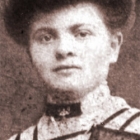Everone when visits Hagia Sophia as a tourist today enters from the vestibule on the south side of the building. Here was discovered a beautiful mosaic.

- A Scotman in Russia
- The First Steps
- Russian Military Flying Schools
- The Imperial All Russia Aero Club
- General Baron Kulbars & Aviation
- The Imperial Russian Technical Society
- The Prototype of the Zeppelin
- Contruction, Aviators & Workmen
- Famous Russian Flying Men
- I.I. Sikorsky
- Foriegn Aviators in Russia
- Heir Fokker's Russian Lady Pilot
- Just Before the War
- Aerial Russia & the British Press
- Aviation & the Russian Press
- By Way of Conclusion

Chapter XVI - By Way of Conclusion
The beginning of the war found Great Britain with an entirely inadequate military aviation service. The high efficiency of the enemy has, however, awakened the nation to the necessity of properly organising her aerial forces. There is, I suppose, no question that the jealousy between the naval and military aviation departments has been most unfortunate, and has considerably hindered the development of a service, the importance of which cannot possibly be exaggerated. However, as I write, it is true, to say that a great change has come over the organisation of Great Britain's aviation force and that something like efficiency has already been attained. It is a matter of history that the success of the early Zeppelin raids was entirely due to the insufficient anti-aircraft defences. As soon as aerial defence was improved, the damage caused by the Zeppelin visits became less, despite the facts that the raids were more frequent and the raiders more powerful.
The radical improvement, in a very short time, of military aviation in this country can only be explained by the high level of capacity possessed by the aviation authorities and the magnificent courage and enterprise of the British flying-men. I was privileged, in company with some of my comrades of the Russian Flying Corps, to visit, by special permission of Lieut.-General Sir David Henderson, several centres of British aviation. I was immensely impressed with the fine organisation and complete equipment of the British aerial forces, and my opinion was fully shared by such aviation experts as Captain Roudneff and Commander Diboysky, the first aviator who devised a means of firing a machine-gun through the propeller of an aeroplane. British aerial photography is unquestionably the best in the world. This branch of the service has made reconnoitring an exact science and has entirely replaced the cavalry as an observation force.
It is perfectly obvious that the aeroplane must play an ever-growing part in the wars of the future. The cavalry has already lost most of its importance in the field owing to the progress of aviation, The same thing will happen, I believe, to land artillery, and there will come a considerable modification in the use of the navy. It is already recognised that the flying-machine supplies the best means of attacking the enemy's bases and his means of communication. Operations at the enemy's rear by means of brilliant cavalry raids become a more and more impossible. Their place has been taken by the raids of aerial flotillas, by which desirable results can be obtained with the use of very limited forces.
The Russian strategists realised the transformation that was imminent, and they were persuaded that aerial flotillas must be created on the lines proved successful in the navy. Modern sailors agreed in their high estimate of the fighting value of Dreadnoughts, and adopting the same principle, Russia gave its most serious attention to the development of the Sikorsky giant. It is indeed obvious that these powerful aerial cruisers, armed with comparatively heavy guns and capable of attaining a high speed, must have a supreme tactical and, strategical importance in battles in the air. I re-affirm my conviction that the Sikorsky giant, of the "Ilia Mourometz" type, is, up to now, the most important development of the aeroplane, and Russia may well be proud of the achievement of her son, and I repeat my astonishment that the fact of the construction of this "Monarch of the Air" has remained utterly unknown to the British public.
But Russia has not remained content with the "Ilia Mourometz." Recently Professor Slessareff has constructed a greatly improved giant on a much larger scale based on the designs of Mr. Kennedy. Professor Slessareff should have joined Mr. Kennedy in London to build this aeroplane in this country, but was unable owing to the war. A certain Polish millionaire provided the Grand Duke Alexander Michailovitch with the necessary money for this new enterprise, and the super-Dreadnought of the air is now ready to begin its career in Russia. It will be piloted by Captain Roudneff, one of Russia's most experienced aviators, who was recently with me in London. Captain Roudneff has commanded the "Ilia Mourometz." He flew on her from Petrograd to Lemberg and bombarded that town. Later on he bombarded Przemysl and made a highly successful reconnaissance over the German army in Poland, discovering a deployment and preventing the Russian forces from being encircled. Captain Roudneff was in London on a highly important mission. Thanks to the splendid co-operation of Sir David Henderson he was able to obtain all the necessary equipment and arms for the new giant. I myself am able to bear witness to the cordiality with which the British military authorities helped my fellow countryman, who left England convinced that in the British flying corps and its chiefs the Russians have loyal and faithful brothers in arms.
To me, living in England and loving England, it is a matter of great interest that this country should play its part in the history of the Russian giant planes. I am able to state that the Grand Duke Alexander Michailovitch was deeply touched by the sympathy shown to Captain Roudneff, and that he has expressed his personal thanks both to Sir David Henderson and Major L. V. Stuart Blacker, and to Captain C. D. M. Campbell, who spent many weeks with Captain Roudneff and secured him everything he needed. This is a splendid example of the solidarity between two great countries and another step towards the creation of a firm and durable alliance.

Above: A Late type of giant Sikorsky biplane about to ascend for reconnaissance.
Let me assure the British public that in the ranks of Russia's aviators and aerial scientists there is an inexhaustible supply of ideas, which if they could be backed by Great Britain's industrial and financial resources would secure for the two countries a pre-eminence in the air which Germany could never challenge. America has already realised Russia's brain potentialities and American capitalists are at this moment in Russia endeavouring to establish relations with her technical experts.
It will be understood that in this book I have been able to tell only part of my story. The pen of a military writer at a time of war must be restrained, but I trust I have said enough to prove that Russia may claim splendid achievements in the science of aviation and that Russian airmen may look their foreign colleagues in the eyes without apology or shame. One day, perhaps, the world will know how much the Russian airmen have done to stem the German torrent and to save Europe from Prussian tyranny. When that story is told Great Britain will have the same affectionate admiration for the Russian Flying Corps as it has already conceived for the glorious Russian army.



